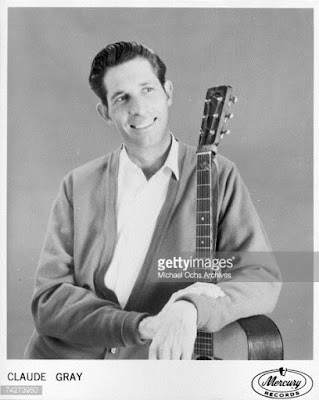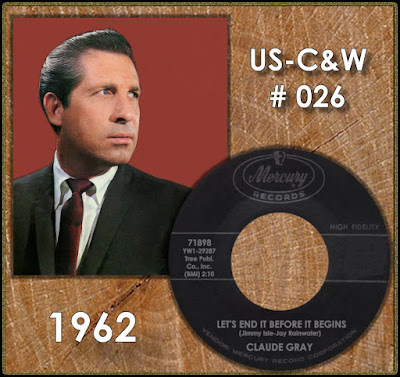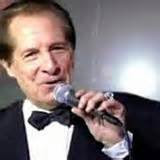Claude Gray (born January 26, 1932 in Henderson, Texas) is an American country music singer-songwriter and guitar picker best known for his 1960 hit "Family Bible," which has been covered by many different artists. Gray's other hit, "I'll Just Have Another Cup Of Coffee," was covered and rearranged by Jamaican reggae singer-songwriter Bob Marley, who retitled the song as "One Cup ![]() Of Coffee." Gray stands 6'5" and because of his height, was given the moniker, "The Tall Texan."
Of Coffee." Gray stands 6'5" and because of his height, was given the moniker, "The Tall Texan."
 Of Coffee." Gray stands 6'5" and because of his height, was given the moniker, "The Tall Texan."
Of Coffee." Gray stands 6'5" and because of his height, was given the moniker, "The Tall Texan."Alongside artists such as Ray Price, Jim Reeves, Eddy Arnold, Don Gibson and Chet Atkins, Gray was a purveyor of the Nashville sound, embracing the Countrypolitan movement which paved the way for pop-oriented singers in country music and attracted new audiences to the genre.
Gray started his singing career while attending High School in his hometown of Henderson, Texas. ![]() After school, he served in the United States Navy from 1950 to 1954. Upon his return to home, he worked as a salesman for the rest of the decade. He began a recording career in 1959, after working as a radio announcer in Kilgore, Texas, and performing as a disc jockey in Meridian, Mississippi.
After school, he served in the United States Navy from 1950 to 1954. Upon his return to home, he worked as a salesman for the rest of the decade. He began a recording career in 1959, after working as a radio announcer in Kilgore, Texas, and performing as a disc jockey in Meridian, Mississippi.
 After school, he served in the United States Navy from 1950 to 1954. Upon his return to home, he worked as a salesman for the rest of the decade. He began a recording career in 1959, after working as a radio announcer in Kilgore, Texas, and performing as a disc jockey in Meridian, Mississippi.
After school, he served in the United States Navy from 1950 to 1954. Upon his return to home, he worked as a salesman for the rest of the decade. He began a recording career in 1959, after working as a radio announcer in Kilgore, Texas, and performing as a disc jockey in Meridian, Mississippi.Gray was approached by Pappy Daily's D records in 1959, and recorded "I'm Not Supposed," which was released as his first single. The song made the Cashbox country charts. The following year, Gray and two friends purchased the song "Family Bible" from Willie Nelson for $100. Gray then recorded the song, and released it as a single." It peaked at No. 10 on the country charts.
In 1961, "I'll Just Have a Cup of Coffee (Then I'll Go)," was released, which peaked at No. 4, and was followed by the biggest hit of Gray's career, the No. 3 "My Ears Should Burn (When Fools Are Talked About)," which was penned by Roger Miller. Gray's final top ten hit came in 1967 with "I Never Had the One I Wanted," which was also his final charted song upon re-release in 1979.
In the late 1970s, Gray co-wrote with Walt Breeland, a ![]() controversial song entitled "The Ballad of Jimmy Hoffa." Gray's record label at the time (Mercury Records) refused to allow him to record the song, but he eventually recorded it for Ol' Podner Records, who subsequently released it directly to the Teamsters. He moved to Million Records and had a minor hit, "Woman Ease My Mind," in 1973. He appeared on the charts only sporadically after that, scoring a hit in 1986 with his version of Neil Diamond's "Sweet Caroline."
controversial song entitled "The Ballad of Jimmy Hoffa." Gray's record label at the time (Mercury Records) refused to allow him to record the song, but he eventually recorded it for Ol' Podner Records, who subsequently released it directly to the Teamsters. He moved to Million Records and had a minor hit, "Woman Ease My Mind," in 1973. He appeared on the charts only sporadically after that, scoring a hit in 1986 with his version of Neil Diamond's "Sweet Caroline."
 controversial song entitled "The Ballad of Jimmy Hoffa." Gray's record label at the time (Mercury Records) refused to allow him to record the song, but he eventually recorded it for Ol' Podner Records, who subsequently released it directly to the Teamsters. He moved to Million Records and had a minor hit, "Woman Ease My Mind," in 1973. He appeared on the charts only sporadically after that, scoring a hit in 1986 with his version of Neil Diamond's "Sweet Caroline."
controversial song entitled "The Ballad of Jimmy Hoffa." Gray's record label at the time (Mercury Records) refused to allow him to record the song, but he eventually recorded it for Ol' Podner Records, who subsequently released it directly to the Teamsters. He moved to Million Records and had a minor hit, "Woman Ease My Mind," in 1973. He appeared on the charts only sporadically after that, scoring a hit in 1986 with his version of Neil Diamond's "Sweet Caroline." Today, Gray continues to tour with The Claude Gray Road show, performing shows throughout North America and in parts of Europe, where classic country music remains popular. Recently, Gray has appeared in Branson and is also a performer on the RFD-TV cable television Network.
Today, Gray continues to tour with The Claude Gray Road show, performing shows throughout North America and in parts of Europe, where classic country music remains popular. Recently, Gray has appeared in Branson and is also a performer on the RFD-TV cable television Network.Claude's recording career includes working with the Mercury, Columbia, and Decca record labels. He did a total of sixteen albums, 53 singles of which 18 reached the Billboard Top 20 on the national country charts. He's done personal appearances in a number of European countries and 49 of the 50 United States. (Info mainly Wikipedia)

